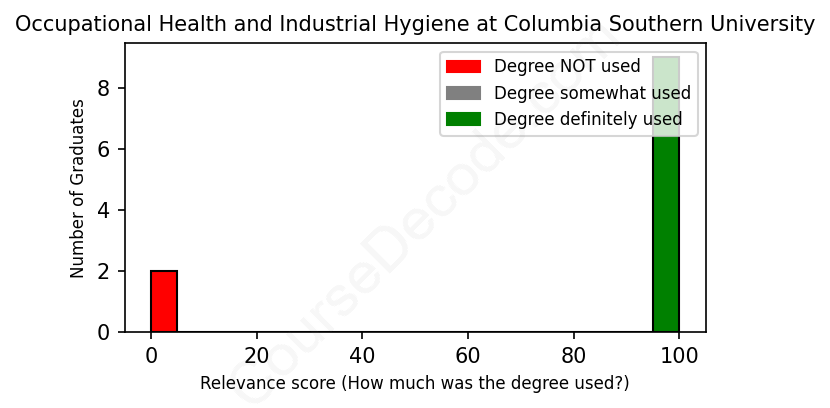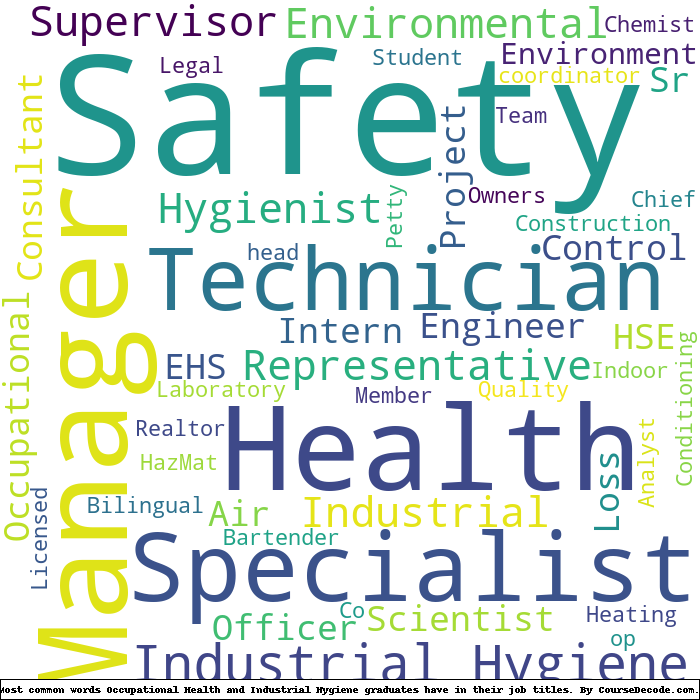
First, some facts. Of the Occupational Health and Industrial Hygiene graduates from Columbia Southern University we've analyzed , here's how many have used (or NOT used) their degree in their career:

These are estimates based on AI analysis of 11 LinkedIn profiles (see below).
The verdict? Significantly above average. Overall, with an average relevance score of 81%, Occupational Health and Industrial Hygiene graduates from Columbia Southern University have a much higher likelihood (+14%) of finding work in this field compared to the average graduate across all fields:
And for comparison, here's the chart for all profiles we've looked at across all degrees.
Also, after graduating, only 0% of these graduates have pursued further education other than another Bachelor's degree (such as a Masters degree or other), compared to the average across all profiles of 35%. This suggests a Bachelors degree is enough for most Occupational Health and Industrial Hygiene graduates, and it's normal to look for work straight after graduation.
See the details:
|
Relevance score: 100% We think this person has gone into a career highly relevant to their degree. We think this person has gone into a career highly relevant to their degree.
DEGREE INFOGraduated in 2023 from Columbia Southern University with a Bachelor of Science (BS) in Occupational Health and Industrial Hygiene. No other secondary education since. JOB HISTORY SINCE GRADUATIONSafety Manager Magbee Contractors Supply May 2023 - Present ABOUTNo information provided. |
The top 10 most common jobs done by the graduates we've analyzed (ranked most common to least) are:
People with a degree in Occupational Health and Industrial Hygiene from Columbia Southern University have landed a variety of jobs, mostly in safety management and specialist roles. The majority of these positions, like Safety Manager or Occupational Health and Safety Specialist, are closely tied to the principles they learned during their studies. Jobs such as Safety Specialist at different companies or Environmental Health and Safety Manager show a strong reliance on the knowledge from their degree, focusing on implementing safety regulations and promoting health standards in workplaces. This indicates that their education has been directly applicable to their careers.
However, not everyone has stayed on the path directly related to their degree. For instance, there's someone who became a Licensed Realtor and another who is enjoying retirement without using their Occupational Health and Industrial Hygiene knowledge. While these jobs may provide personal satisfaction or financial stability, they don’t connect with the skills learned in their studies. Overall, the majority have managed to find relevant positions that actively utilize their education, suggesting that a degree in this field can indeed lead to fruitful and applicable career opportunities.
Here is a visual representation of the most common words in job titles for Occupational Health and Industrial Hygiene graduates (this is across all Occupational Health and Industrial Hygiene graduates we've analyzed, not just those who went to Columbia Southern University):

Graduates from Columbia Southern University's Occupational Health and Industrial Hygiene program seem to have quite a solid career trajectory. Most of them are starting out in relevant roles that align directly with their degree, such as Safety Representatives and Occupational Health and Safety Specialists. Many find positions within well-respected organizations or companies—like the US Army Corps of Engineers and major corporations like Amazon—early in their careers. This suggests that graduates are stepping into roles that not only utilize their education but also set them up for future success.
Looking five to ten years down the line, the patterns seem to continue positively. A number of these individuals progress into senior or managerial roles, such as Safety Managers and Environment, Health, and Safety Managers. We also see some diversifying into industry-specific positions, like Industrial Hygiene Technicians at John Deere. However, it's worth noting that while many stick closely to their field, some have ventured into entirely different careers, like real estate. Overall, though, it seems like a good number of alumni are achieving careers that are relevant to their studies, which is pretty encouraging for future graduates considering this path.
Honestly, a Bachelor’s degree in Occupational Health and Industrial Hygiene can be a bit of a mixed bag. At Columbia Southern University, which is known for its online programs, a lot of students find it pretty manageable, especially if you’re good at self-discipline and time management. The coursework involves a decent amount of science and safety regulations, so if you don’t mind diving into some technical material, it can be a smoother ride. Overall, it’s probably a bit easier than average if you stay on top of your assignments and participate in discussions, but like any degree, it still requires effort and commitment to really grasp the concepts.
Most commonly, in the LinkedIn profiles we've looked at, it takes people 4 years to finish a Bachelor degree in Occupational Health and Industrial Hygiene.
So, looking at these graduates from Columbia Southern University, it seems like they've landed some pretty solid jobs in the safety and health field, especially considering the roles and companies involved. Many of them have moved up the ladder to managerial positions, like the one working as a Sr. Safety Manager at Amazon and others heading teams at construction firms and engineering companies. Those roles usually pay well, often exceeding the average salary in many professions. Even the newer graduates are starting strong, with positions at recognized places like BLUE ORIGIN and a Scientist role that likely comes with decent pay. Overall, it looks like they've done well for themselves financially, and the career prospects in this field seem pretty promising!
Here is a visual representation of the most common words seen in the "about" section of LinkedIn profiles who have a Bachelor degree in Occupational Health and Industrial Hygiene (this is across all Occupational Health and Industrial Hygiene graduates we've analyzed, not just those who went to Columbia Southern University). This may or may not be useful:

Here are all colleges offering a Bachelor degree in Occupational Health and Industrial Hygiene (ordered by the average relevance score of their Occupational Health and Industrial Hygiene graduates, best to worst) where we have analyzed at least 10 of their graduates:
| College | Score | Count |
|---|---|---|
 Columbia Southern University Columbia Southern University
|
81 | 11 |